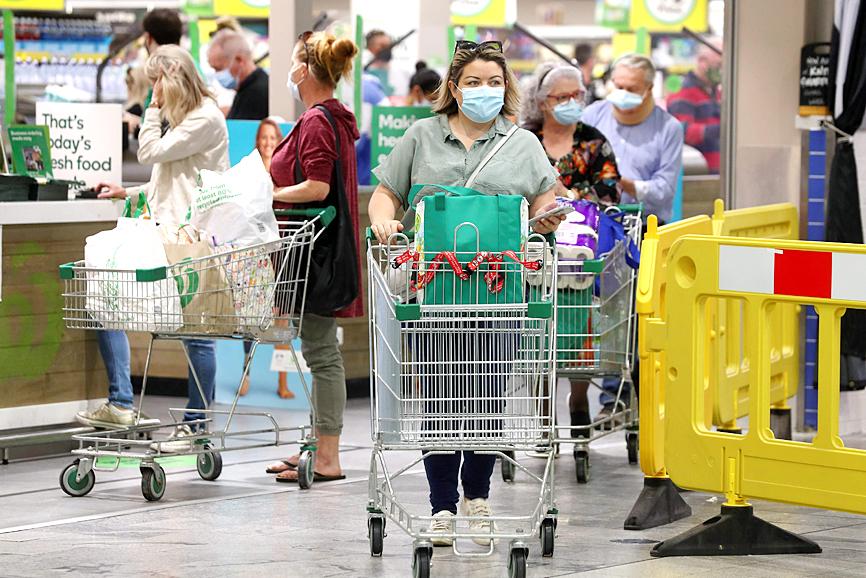Mushrooming outbreaks of the Delta variant of SARS-CoV-2 prompted China and Australia to impose stricter COVID-19 curbs yesterday, as the WHO urged the world to contain the mutation before it turns into something deadlier and draws out the COVID-19 pandemic.
China’s most serious surge of coronavirus infections in months spread to two more areas yesterday — Fujian Province and the megacity of Chongqing — in an outbreak that now spans 14 provinces.
More than 200 cases have been linked to a Delta cluster in Nanjing, where nine cleaners at an international airport tested positive.

Photo: AFP
“The main strain circulating at present is the Delta variant ... which poses an even greater challenge to virus prevention and control work,” Chinese National Health Commission spokesman Mi Feng (米鋒) said.
The nation where the disease first emerged has rushed to prevent the highly transmissible strain from taking root by putting more than 1 million people under lockdown and reinstituting mass testing campaigns.
Worldwide, coronavirus infections are once again on the upswing, with the WHO announcing an 80 percent average increase over the past four weeks in five of the health agency’s six regions, a jump largely fueled by the Delta variant.
First detected in India, the strain has now reached 132 countries and territories.
“Delta is a warning: It’s a warning that the virus is evolving, but it is also a call to action that we need to move now before more dangerous variants emerge,” WHO Health Emergencies Program executive director Michael Ryan told a news conference.
Both high- and low-income countries are struggling to gain the upper hand against Delta, with the vastly unequal sprint for vaccines leaving room for variants to wreak havoc and further evolve.
In Australia, where only about 14 percent of the population is jabbed, the third-largest city of Brisbane and other parts of Queensland state entered a snap lockdown yesterday as a cluster of the Delta variant produced six new cases.
“The only way to beat the Delta strain is to move quickly, to be fast and to be strong,” Queensland Deputy Premier Steven Miles said while informing millions that they would be under three days of strict stay-at-home orders.
Restrictions are also in place in many other parts of the Asia-Pacific region to combat Delta. In Malaysia, a nationwide lockdown spurred protest yesterday as people defied the curbs to take to the streets, piling pressure on Malaysian Prime Minister Muhyiddin Yassin to resign.
“This government is ... crippling the economy and also destroying our country’s democracy,” Karmun Loh, taking part in the protest in downtown Kuala Lumpur, told reporters.
However, the Bangladeshi government was easing curbs, despite a Delta surge, prompting hundreds of thousands of garment workers to rush back to major cities after the government said export factories could reopen from today.
With the Delta variant spreading at speed, doubts are growing over the efficacy of vaccines against the strain.
The US Centers for Disease Control on Friday released an analysis that found fully immunized people with so-called breakthrough infections of the Delta variant can spread the disease as easily as unvaccinated people.

SECURITY: As China is ‘reshaping’ Hong Kong’s population, Taiwan must raise the eligibility threshold for applications from Hong Kongers, Chiu Chui-cheng said When Hong Kong and Macau citizens apply for residency in Taiwan, it would be under a new category that includes a “national security observation period,” Mainland Affairs Council (MAC) Minister Chiu Chui-cheng (邱垂正) said yesterday. President William Lai (賴清德) on March 13 announced 17 strategies to counter China’s aggression toward Taiwan, including incorporating national security considerations into the review process for residency applications from Hong Kong and Macau citizens. The situation in Hong Kong is constantly changing, Chiu said to media yesterday on the sidelines of the Taipei Technology Run hosted by the Taipei Neihu Technology Park Development Association. With

A US Marine Corps regiment equipped with Naval Strike Missiles (NSM) is set to participate in the upcoming Balikatan 25 exercise in the Luzon Strait, marking the system’s first-ever deployment in the Philippines. US and Philippine officials have separately confirmed that the Navy Marine Expeditionary Ship Interdiction System (NMESIS) — the mobile launch platform for the Naval Strike Missile — would take part in the joint exercise. The missiles are being deployed to “a strategic first island chain chokepoint” in the waters between Taiwan proper and the Philippines, US-based Naval News reported. “The Luzon Strait and Bashi Channel represent a critical access

CARROT AND STICK: While unrelenting in its military threats, China attracted nearly 40,000 Taiwanese to over 400 business events last year Nearly 40,000 Taiwanese last year joined industry events in China, such as conferences and trade fairs, supported by the Chinese government, a study showed yesterday, as Beijing ramps up a charm offensive toward Taipei alongside military pressure. China has long taken a carrot-and-stick approach to Taiwan, threatening it with the prospect of military action while reaching out to those it believes are amenable to Beijing’s point of view. Taiwanese security officials are wary of what they see as Beijing’s influence campaigns to sway public opinion after Taipei and Beijing gradually resumed travel links halted by the COVID-19 pandemic, but the scale of

Pope Francis is be laid to rest on Saturday after lying in state for three days in St Peter’s Basilica, where the faithful are expected to flock to pay their respects to history’s first Latin American pontiff. The cardinals met yesterday in the Vatican’s synod hall to chart the next steps before a conclave begins to choose Francis’ successor, as condolences poured in from around the world. According to current norms, the conclave must begin between May 5 and 10. The cardinals set the funeral for Saturday at 10am in St Peter’s Square, to be celebrated by the dean of the College